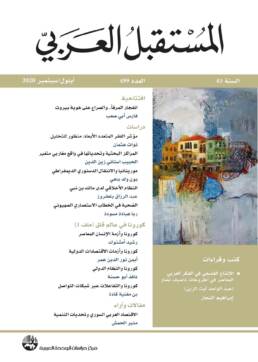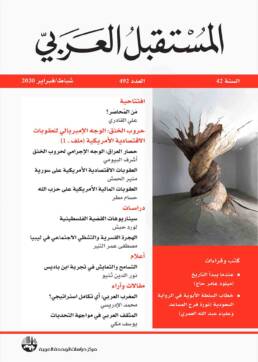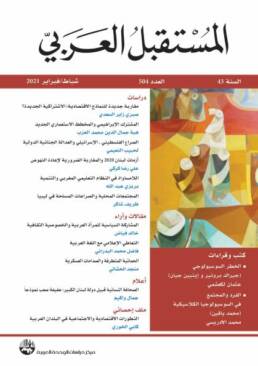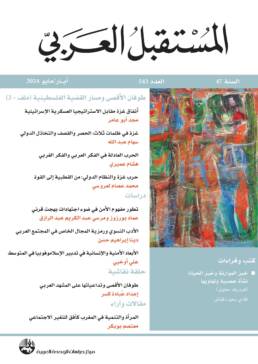Editorial
Al-Aqsa Flood, the Aftermath: Towards a global movement
to liberate Palestine………………………………………….. Fares Abi Saab 7
Studies
Moroccan normalization with Israel and its effects on the Western Sahara
conflict and the Palestinian cause……………………….. Omar Saadallah 13
This study presents a legal discussion about the normalization agreement between the Moroccan Kingdom and “Israel”, examining its patterns and the goals it seeks to achieve. The study also aims to address the problematics of giving a precise legal description of the Convention, distinguishing it from similar ones, and identifying its dangers to the North African region by virtue of association with occupation, racial discrimination, and grave violations of international humanitarian law. The study analyzes the concept of normalization, its desired goals, and presents the patterns of normalization, its risks, and how it promotes Israeli political and security institutions as pivotal in managing the affairs of the region. The study demonstrates the need to harmonize these agreements with the principles of international humanitarian law and human rights, in order to play a role in the conflict in Western Sahara and Palestine.
Keywords: Morocco, Israel, Normalization, Western Sahara, North Africa.
The historical roots behind the Libyan state failure………… Ali ben Musa 29
This paper discusses the phenomenon of state failure in general, and the Libyan state in particular, by studying the legacy left by Gaddafi regime and its impact on the institutions, which are believed to have become more fragile during his rule. The study discusses how the historical legacy of the Gaddafi regime played a role in the failure of the Libyan state after 2011, and assumes that personal authoritarian regimes such as the Gaddafi regime are the most harmful to state institutions. Given the inability of the ruling elite to restrict the behaviors and decisions of the authoritarian leader, which often aim to prevent the existence of any real institutions that might limit his ability to exercise power.
Keywords: Failure of the State, Libyan State, Gaddafi Regime, Libya.
Electoral governance in Algeria: 2021 legislative and local
elections…………………………….. Bouhania Goui and Hawari Al-Abed 43
This research paper discusses the reality of electoral governance in Algeria, after the issuance of law No. 21-01 regulating elections, which was issued on March 10, 2021, and the subsequent legislative and local elections in the same year. The paper questions the extent to which governance indicators are applied in the electoral affairs in Algeria through the aforementioned past election entitlements, and the extent to which they are free from aspects of corruption or fraud. The integrity and credibility of elections is considered essential in the democratic process of any country, given that it produces future elites capable of managing people’s concerns and hopes, and formulate development strategies that are in the interest of the country.
Keywords: Governance, Elections, Electoral System, Legislative Elections, Local Elections.
Outcomes of development policies
in Tunisia 1956 – 2021……………………….. Abdul Rahman Al-Marsani 66
Tunisian independence represented a turning point in its modern history. There were great ambitions to fulfill the people’s needs, yet poverty continued, and the imbalance between groups and regions and the unequal distribution of wealth increased. Despite the success of independence in developing programs that fall within the framework of what is known as the interventionist state, the level of influence of these programs has declined due to donor recommendations from international financial institutions, and the impact of successive economic crises and social upheavals. Although the slogans of the 2010-2011 revolution were clear from the beginning, the new political elites failed to find actual solutions that meet the peoples’ demands, which further deepened the economic and social crisis in the country.
Keywords: Development, Economic and Social Model, Employment, Balance between Groups and Regions, Structural Reform.
Using cyber-human knowledge to build a Palestinian
knowledge society…………………………………. Abeer Jihad Al-Natsheh 85
The emergence of a Palestinian knowledge society requires the presence of a human force with a high level of education and high technical skills. University and research centers are central in knowledge production. This study aims to identify the educational requirements for achieving a knowledge society in Palestinian society in the occupied territories of 1967, the role of Palestinian universities in building a knowledge society, and examining the impact of Zionist occupation practices in controlling communication technologies and in building a Palestinian knowledge society. The study shows the disparity between administrations in Palestinian universities, the clarity of their plans and policies in promoting scientific research, and the impact of occupation practices on the Palestinian knowledge production in terms of quantity and quality, and thus in the process of building a Palestinian knowledge society.
Keywords: Usage, Human Knowledge, Knowledge Society, The Internet.
The Arab intellectual and the dilemma of identity in the era
of cultural transformation……………………………….. Idris El-Ganbouri 98
The study addresses the problems related to the historical emergence and development of the Arab intellectual since the end of the nineteenth century, and questions the Arab intellectual experience throughout this complex path due to cultural and political tensions, and the aspects of presence and absence that characterized the behavior of the intellectual during this era. The study points that the Arab intellectual underwent a set of transformations that did not establish a kind of accumulation at the theoretical level, due to ideological polarization that characterized his performance. The study also shows how the man of reform, who formed the first manifestation of the Arab intellectual, from whom emerged corresponding and discordant types of Arab intellectuals, tested a set of ideological options that all poured into renaissance and change.
Keywords: Arab Intellectual, Identity, Renaissance, Change, Cultural Renewal.
The imperialist way of life: the crisis of man and nature
in global capitalism……………………………………… Bashar Al-Zubaidi 117
This Study discusses the multiple crises of global capitalism, most notably the economic, environmental, and democracy, and their relationship to lifestyles in both Northen & Southern countries. The article argues that the current prevailing way of life is “imperial”, because it requires disproportionate and unlimited access to resources, carbon emission and labor. The study analyzes the imperialist way of life as a structural restriction of people’s opportunities in both Northen & Southern countries. The fundamental paradox of this pattern is its expansion towards Southern countries, although it cannot be generalized for social and environmental reasons. The article calls for adopting a “solidarity lifestyle” based on justice and environmental protection instead of an “imperialist lifestyle.”
Keywords: Capitalism, Neoliberalism, Environmentalism, Southern Countries, Northern Countries, Justice, Equal Opportunities.
Articles and opinions
How does Ibn Khaldun and social sciences explain the birth
of human urbanism science?…………………….. Mahmoud Al-Dhaouadi 131
The “pathology” of functional wars in Europe and the rise
of China………………………………………………………… Ihsan Al Hafezi 139
Books and Readings
History and the narrative imagination in the Arabic novel:
selected models (Said Bouaita)…………………………… Nadia Belagrich 153
Books Summaries……………………………………………………………….. 160
Arabic Books: Russian Gas Pipelines: Geopolitical and Economic Dimensions; Sinai Province: Transformations of Jihadist Violence in Egypt; China-Saudi relations: From non-recognition to strategic partnership (1978 – 2008); Citizenship Values: Education – Trials
Foreign Books: The Alternative: How to Build a Just Economy; Spoils of War in the Arab East: Reconditioning Society and Polity in Conflict; Tribes and Politics in Yemen: A History of the Houthi Conflict; NATO and the Russian War in Ukraine: Strategic Integration and Military Interoperability
Research Reports: “Are Taiwan and China on a Collision Course?: Taiwanese Voters Defy China, Elect Pro-sovereignty Lai President”; “Can a Regional War Be Avoided in the Middle East?”.
Add a review
You must be logged in to post a review.








